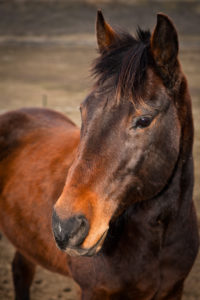
There are common questions when it comes to winter and horses, such as whether or not to blanket. But what about supplements? Is it necessary to continue with your hoof or joint supplements during the winter months? This month we want to explore winter weather conditions and supplementation with regard to your pasture pals, athletes, and your senior horses.
In the winter months, many horses require extra energy to help them maintain their body temperature and avoid weight loss. According to the National Research Council, horses require 1-2 percent of their body weight in forage each day. In the winter months, horses should receive forage amounting to 1.5-3% of their body weight. If you don’t have a scale to weigh your horse, you can obtain an estimate using a weight tape that can be purchased at a feed store or online. You can also determine your horse’s weight by measuring the horses body length and heart girth in inches and calculate weight using the following equation: heart girth x heart girth x body length, divided by 330. It is beneficial to determine your horse’s weight at the beginning of every season to evaluate necessary feed adjustments.
General Recommendations:
Forage can include long stem hay, chopped hay or forage-based cubes. If you need to supplement with concentrate rations to increase caloric intake, do so slowly at an increase of ½ pound per day. Horses should also have access to salt and unlimited ice-free water. One indication that your horse is not receiving adequate feed/water intake is the presence of dry and sparse feces, as well as increased wood chewing and weight loss. If your horse is blanketed, be sure to remove it daily and palpate the neck/rib areas to determine body condition
Supplements:
If you decide to give your horse a winter vacation from the arena or the trails and think you don’t need to give any supplements, you may want to consider that decision carefully. Some horses require more or different supplements during the winter that are not necessary during the summer.
Digestive Aids or Gastric Ulcer Supplements – Horses that are confined to stalls during prolonged cold spells may experience psychological stress that can increase the risk of gastric ulcers. Horses out on pasture with free access to forage may not have this problem in the summer. If your horse is stalled or penned with limited access to forage, consider supplements that provide stomach buffers, as well those that provide calming actions, such as GasterGuard and Quiettude.
Hoof Supplements – Depending on the weather, hoof quality can be adversely impacted during the winter. Mud, hard ground conditions, and limited movement can affect circulation as well as contribute to cracked and damaged hooves. If you discover your horse’s hooves in this condition it might be advisable to use a product such as Foundation4. Additionally, some hoof supplements work from the cornet band down and require 3-6 months to see results. Therefore, taking the winter off from these supplements could result in a delay when your warm weather riding opportunities emerge.
Respiratory Supplements – Horses that are competing in indoor arenas or that are stalled in barns during the winter may benefit from respiratory supplements. Indoor facilities can contain allergens as well as ammonia that can be damaging to the respiratory system.
Immune Boosting Supplements – Horses that are stressed, whether from the cold or from being stalled, can experience decreased immunity. Feeding a supplement such as X-Ponent, DailyM, or GenM can counteract this process and keep your horse healthier during these times. Our own horses, that are not seniors, receive our Daily M supplement during the winter. This blend contains herbs such as Flax and Astragalus that are high in Omega-3’s and antioxidants for boosting immunity.
Joint Supplements – Winter months are particularly difficult for many of our older horses that suffer from osteoarthritis. I know for myself, when the mercury drops I am quickly reminded of my past injuries and my aging joints. In addition, many of our horses move less due to the snow and icy ground conditions. Limited movement can cause additional stiffness in your older horse. At this point, there is no silver bullet for reversing arthritis, but it can be managed by controlling inflammation and its corresponding pain.
Although there are several joint supplements on the market, it is important to research the ingredients. According to an article written by Stacey Oke, DVM in The Horse, research-proven ingredients include glucosamine, chondroitin, avocado-soybean unsaponifiables, green tea extracts, and omega fatty acids, as well as curcumin, turmeric and polyphenolic plant extracts.
Supplementing with a fat source that is high in omega-3 fatty acids, such as flax, will help boost your horse’s immunity and have an anti-inflammatory effect. In contrast, omega-6 fatty acids that are often found in grains tend to be pro-inflammatory.
Amy Gill, PhD equine nutritionist suggests using caution when feeding glucosamine to horses who are insulin resistant or have Cushing’s disease because glucosamine contains glucose. However, some veterinarians argue that the amount is insignificant in comparison to the horse’s total caloric intake and the benefits outweigh the risk.
We feed our Gen M Blend to our older horse with arthritis. It contains Ashwaganda, Boswellia, Turmeric, Flax Seed, Hawthorn and Celery Seed. These herbs contain anti-inflammatory, immune boosting and circulatory boosting properties. A 2003 study published in the journal of Phytomedicine “found that all 30 people with OA knee pain who received boswellia reported a decrease in knee pain. They also reported an increase in knee flexion and how far they could walk.”
To continue to support your older horse’s management of arthritis, it may be helpful to keep them moving during the winter months, even if it just means walking or riding them around the pasture a few times on a consistent basis. However, they will require a longer warm-up period than they do in the summer.
